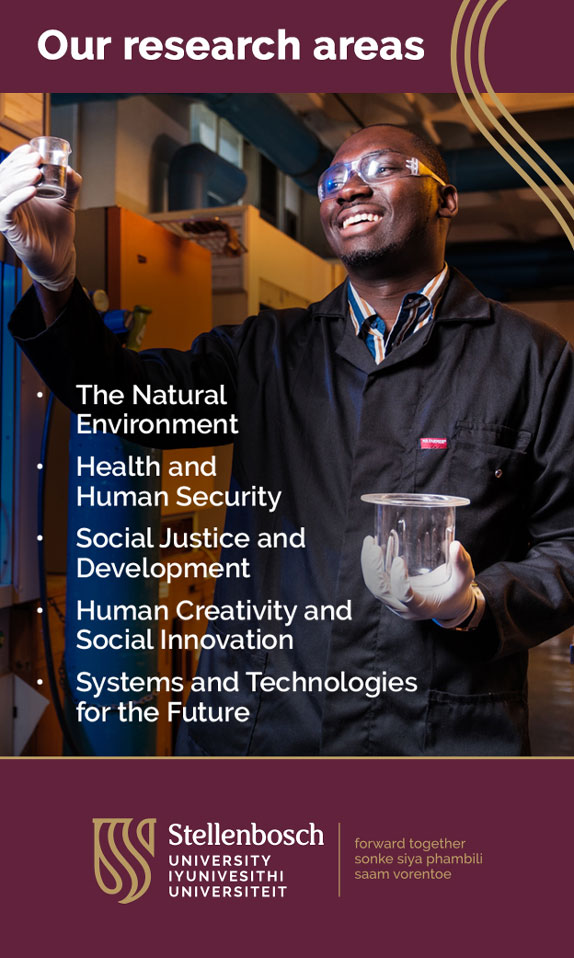Research Chairs
The Research Chairs hosted by Stellenbosch University are positioned strategically around specific research areas in which the University is seen as a leader in the field and where resources and capacity exist for a focused knowledge and human resource intervention. The aim of the initiative is to make South Africa competitive in the international knowledge economy based on its existing and potential strengths. Stellenbosch University currently hosts 46 chairs, of which 29 form part of the South African Research Chairs Initiative (SARChI), funded by the National Department of Science and Technology (DST), through the National Research Foundation (NRF) in South Africa.
The Research Chairs are:
|
Antenna Systems for SKA Engineering Electromagnetics Genetic Tailoring of Biopolymers Economics of Social Policy Land, Environment & Sustainable Development Science Communication Functional Nanostructured Materials Nanostructured Functional Materials Aeronautical Dynamics & Control Energy Research Human Rights Law Experimental Petrology Photovoltaic (PV) Systems Advanced Marcromolecular Architectures Pavement Engineering |
Photonics - Ultrafast and Ultra-intense Laser Science Posttraumatic Stress Disorder (PTSD) Property Law Meat Science: Genomics to Nutrinomics Integrated Wine Sciences Applied Pre-harvest Decidious Fruit Research Wastewater Management Intellectual Property (IP) Agronomy (2 Chairs) TB Biomarkers Animal Tuberculosis (TB) Social-ecological Systems and Resilience Artificial Intelligence Paediatric Tuberculosis (TB) Analytical Polymer Science Postharvest Technology |
Quantum, Optical and Atomic Physics Integrative Skeletal Muscle Physiology, Biology and Biotechnology Mathematical and Theoretical Physical Biosciences Mechanistic Modelling of Health and Epidemiology Mycobactomics Gender Politics Studies in Transformation and Historical Trauma Schizophrenia Research PRASA Engineering Biofuels and other clean alternative fuels Sugarcane bio-refining Innovative Rehabilitation Food, Environments, Nutrition and Health |
Centres of Excellence
Our Centres of Excellence enable researchers to collaborate across disciplines and institutions on long-term projects by using existing capacity and resources. These projects are locally relevant and internationally competitive and enhance the pursuit of research excellence and capacity building. Stellenbosch University hosts the following Centres of Excellence:
National Institute for Theoretical Physics (NiTheP): This centre leads and coordinates research programmes andfosters education in theoretical physics. Its mission is to provide a stimulating user facility for theoretical physics that links South Africa and the continent to an international family of institutes for theoretical physics.
DST-NRF Centre of Renewable and Sustainable Energy (CRSES): The objective of CRSES is to develop and enhance national capacity in renewable and sustainable energy in support of accelerated and shared economic growth within the area of sustainable energy. CRSES is sponsored by the South African National Energy Research Institute and the Central Energy Fund. It involves interested parties in talks on energy provision in collaboration with the Sustainability Institute at the Spier Estate.
Stellenbosch University Water Institute (SUWI): The SUWI is a multidisciplinary research collective that recognises the complex nature of water management and supply in a water-scarce country such as South Africa. Drawing from the expertise of leading researchers from almost all faculties at the University, the SUWI offers an ideal environment for students and young water professionals to get involved in projects funded by government, industry and international funding agencies, to conduct studies and research aimed at solving our industry and public partners’ problems.
DST-NRF Centre of Excellence For Biomedical TB Research (CBTBR): The CBTBR combines clinical grassroots investigations into TB with sophisticated laboratory research that involves various departments and disciplines within and beyond the University campus. Whereas much of the work of the CBTBR entails the development of accurate diagnosis and appropriate therapy for MDR and XDR-TB, the Centre also plays an ongoing role in community outreach and awareness to prevent and treat TB.
DST-NRF Centre of Excellence for Invasion Biology (C·I·B): The C·I·B is an inter-institutional Centre of Excellence. Its members undertake research on the biodiversity consequences of biological invasions, largely through postgraduate student training, postdoctoral research projects and long-term biodiversity monitoring. The principal aims of the Centre’s work are to reduce the rates and impacts of biological invasions by furthering scientific understanding and predictive capability, and by developing research capacity.
DST-NRF Centre of Excellence in Scientometrics and Science, Technology and Innovation Policy: This virtual centre is hosted by the Centre for Research on Evaluation, Science and Technology (CREST). The aim is to measure performance and to monitor the effective implementation of science, technology and innovation (STI) policies by developing indicators for knowledge production, innovation, development and networking.
South African Centre for Epidemiological Modelling and Analysis (SACEMA): SACEMA specialises in the mathematical modelling of diseases prevalent in South Africa. The work is multidisciplinary, combining biological, medical, statistical, mathematical and computing skills to study patterns of disease progression, in space and time, at population and within-host levels. The aim of this modelling is to identify the principal causes of diseases and their transmission, and the likely outcomes of various interventions, thereby providing a sound scientific basis for health policy.







